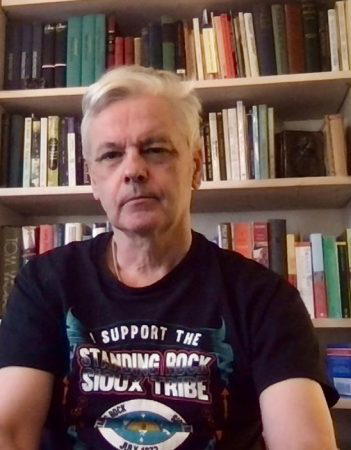We lay in the long wet grass all night waiting for the pale ghost stream of sunlight that announces the dawn of a typical Irish summer day.
At dusk we had crawled through the river field passing stunted gorse bushes bent arthritically by the constant winds coming off the bare black mountain. We pulled the heavy waterproof bag behind us. It slid across the wet grass trying to slip away from us down the shallow slope to the river.
After an hour we were in place. To escape afterwards we would have to run helter-skelter back to the roadway where a car waited for us. Hopefully.
The British Army observation tower was a mile off, obscured by the black clouds sitting low and heavy across the valley and by sheets of hard rain striking all below.
Searchlight beams skimmed our hide. We kept low. We were wet through. The IRA could buy Semtex and Armalites but not rain gear. They did it in Kilmichael in 1920 so we could do it in 1980. Getting drenched with rain. And blood. Tradition is everything in Ireland.
Sheep moved desolately across the field towards us. We kept saying ‘shoo shoo’. Then ‘fuck off’. They took no heed. They knelt down – their front legs bent at spastic angles chomping at the rough grass. Their yellow ugly gums moved arhythmically back and forth. Their vacant eyes looked into ours. Eventually they moved off. Thank Jesus. We were probably too far away in the half light for the Brits to notice the sheep congregating on top of us but no point having extra risks. We were taking enough every day already. Brit patrols, SAS, UVF, UDA, Red Hand of Ulster, Special Branch, premature explosions, febrile comrades, touts a go-go.
We stayed awake for eight hours. The wind coming in from the Atlantic made mournful sighs around us. The early morning smell from bramble bushes and long wet grass was a drug for me. It reminded me of when I was a child walking these sparse fields before the death harmony of Belfast seduced me.
The sounds of an army helicopter brought me back. It was approaching at a steep angle to drop SAS snipers back at base. They had been out all night watching for us or someone like us.
I adjusted the sight. The legs of the tripod were steady. In the viewfinder I watched the faint blue smear of lights of the cockpit controls. The sight was obscured by rain and mist. My spotter scanned the tower in case an alert sentry noticed the long barrel of the Barrett. My watcher said ‘steady’. I always am.
The first shot hit the fuselage. The helicopter faltered. The heat from the discharge sent a fine warm mist off the barrel obscuring my sight. I fired again. This time the heavy gram bullet hit the cockpit – glass shards and blood cascaded out.
The helicopter tipped over. The pilot tried to right it. No good. The blades hit the metal struts of the observation tower. They broke off in long jagged sections that flew away into the surrounding blackness. I saw a pilot tumble out and land on the hard concrete base of the tower. A soldier fell out next. His arms flailing. I hit him in mid air. To make a point. He was blown asunder. The remains of the helicopter burst into flames.
We packed away the rifle and were up and running. Bullets raked the ground near us but they were firing blind. They killed plenty of sheep though. A decoy car bomb would keep them off center as well as Armalite fire from skirmish positions. Purple flares lit up the sky. Beautiful sirens went off loud and longing.
The first British Helicopter ever shot down in Northern Ireland. Six soldiers were killed plus the two pilots. The fight was upgraded. We were feted. We were heroes. For at least a week. We both were sent to sunny Spain where they have real summer days.
But everyday I missed the rain coming fast off the mountain and the long wet grass and the pale ghost stream of dawn light that made me and murdered me.


